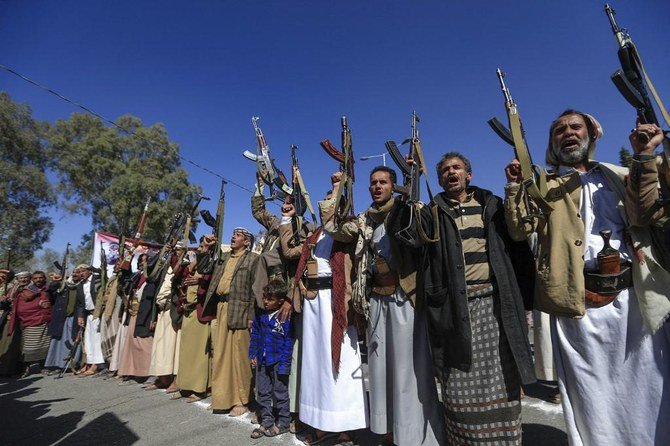AL-MUKALLA: Amnesty International has accused the Iran-backed Houthi militia of arbitrarily abducting hundreds of journalists, human rights defenders and religious minorities, holding them in solitary confinement and dirty prisons, torturing them and using them as leverage during peace talks.
In a 34-page report released on Thursday, the international rights group said that since early 2015, the Houthis have snatched hundreds of journalists, political opponents and members of the Baha’i religious minority and thrown them into small and unhygienic prisons where they were physically and psychologically tortured.
The report went on to claim that the prisoners were denied medication and sufficient food and banned from contacting their families.
The graphic report is based on interviews with 12 former abductees who were released last year following a successful prisoner swap between the Yemeni government and the Houthis. “Detainees lacked adequate access to food, medical care, clean water, sanitation and accommodation. Some were subjected to solitary confinement for 20 days solely for requesting more food from the authorities and going on hunger strike, ” the report said.
A former abductee told the international organization that the Houthi-run Political Security Office kept him disappeared for five months despite promising to question him for a few hours when he was arrested.
“When the Political Security Office knocked at my door asking me to go with them for a few hours for a couple of questions, I did not think of saying goodbye to my family. I didn’t know that I would only speak again with them after five months,” the anonymous detainee said, according to the report.
The report highlighted several informal and formal detention facilities controlled by the Houthis such as the Criminal Investigation and Political Security Office, the National Security Bureau and Hasaba police station, Al-Thawra pre-trial detention facility in the capital, Saref Prison in Beni Hashish in Sanaa province and Shamlan prison in Hodeidah.
The rebels harshly beat detainees inside prisons or during investigations to force them to admit to committing crimes such as working with Israel or the Arab coalition.
A member of the Baha’i community in Yemen said that the Houthi interrogators and security forces beat him with steel rods, an AK-47 rifle and other objects.
“During the interrogation, they would beat me non-stop until I could no longer scream. Sometimes they would wake me up from my sleep for interrogation. I fainted twice during the interrogation mainly because I was psychologically tired and without any food,” the Baha’i member said.
“We were tortured repeatedly only for asking them for water and food. They used to cut off the electricity at night and keep us in the dark as punishment, they would come in the cell and beat us with cables.”
The Houthis have exploited judicial authorities in areas under their control to punish their opponents through long trials where defendants were left to defend themselves, according to the report.
The interviewed abductees and lawyers described the trials at the Specialized Criminal Court and the Court of Appeals in Sanaa as merely “political theatrics,” claiming that judges snubbed their demands for legal representation. They added that judges neglected to investigate incidents of torture and their confessions being extracted under duress.
Shortly after releasing them following a deal, the Houthis immediately expelled the former detainees from their territories and sent the Baha’is into exile, rejecting appeals from some abductees to visit their families in northern Yemen, the report said.
“The (Houthi) authorities allowed us to call our families when we reached the airport … I begged them (the authorities) to allow me to see my father but they didn’t. He is 80 and I won’t be able to see him again. That was the hardest thing in my life, leaving my father behind,” a member of the Baha’i community was quoted as saying.
The rights group has warned the Houthis against using thousands of currently incarcerated political opponents as a bargaining chip in any negotiations with the Yemeni government.
“With negotiations ongoing, Amnesty International urges the Houthi authorities not to use detainees for political leverage and to immediately release all individuals arbitrarily detained on account of their opinion, expression, political affiliation, and conscientiously held beliefs,” the organization said.
Yemeni human rights activists and officials said the Amnesty International report has confirmed well-known information about human rights abuses committed by the Houthis.
Fatehia Al-Mamarie, director of the provincial office of the Ministry of Human Rights in the western province of Hodeidah, demanded the international community and the UN name and shame the Houthis and pressure them to release detainees.
“This is a positive step toward exposing the Houthi crimes and displaying its true image to the international community,” Al-Mamarie told Arab News on Thursday.






















